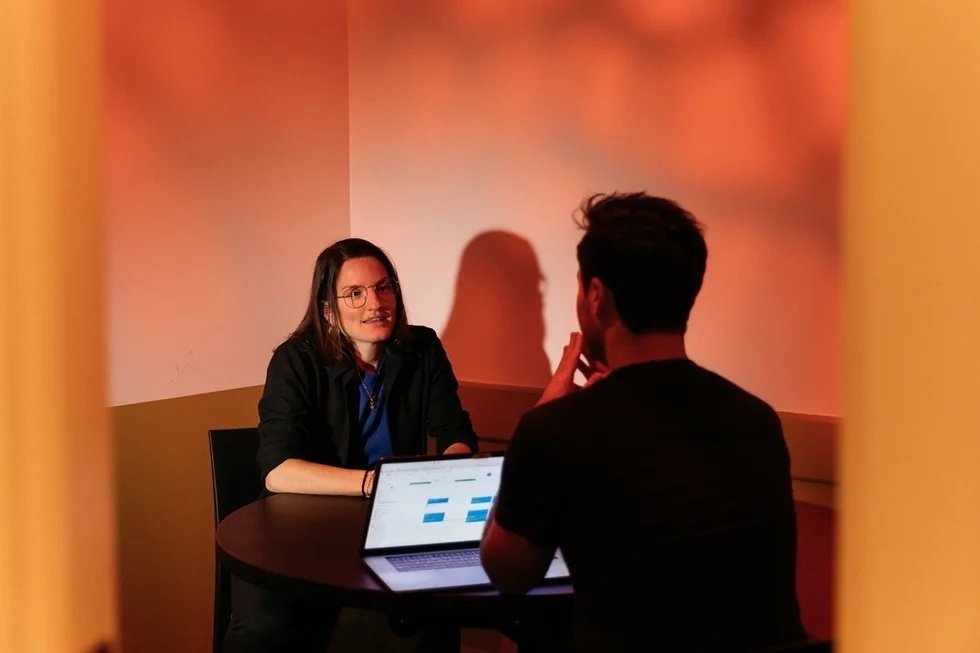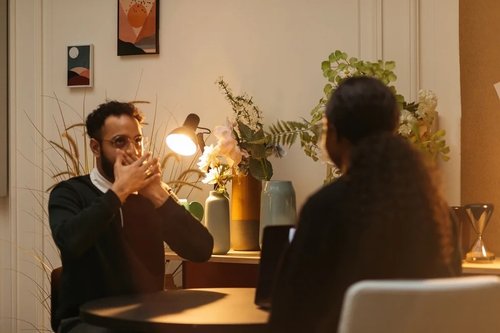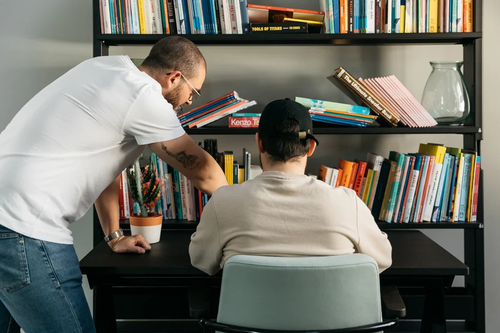Interviewing with a friend: the pros, the cons, and how to handle it
Nov 22, 2022
7 mins


Freelance writer and translator, ex-recruiter
Thanksgiving is almost here. A time for getting festive, giving thanks, and eating way too much food. What does that have to do with interviewing a friend or family member? Well, picture the scene: Everyone you love is there, the turkey (or seitan roast) is carved, the pies are in the oven, and you’re all catching up on each other’s lives. At some point, between watching the football and starting your Christmas shopping, the conversation comes around to work. Who’s doing what, current roles and plans, you mention you’re ready for the next step, or in need of change, and then: Bam! Suddenly Uncle Gerry is setting you up for an interview at his law firm—his wife and son-in-law already work there, and he thinks they have just the role for you.
While the offer is flattering, and to be fair downright tempting, is this something you want to do? Being interviewed by a friend or family member around the dinner table is one thing; meeting them in a professional interview is another altogether. Before you say yes there’s a lot to consider, not just about the interview, but also about your future. Career consultant and former counselor Joa Ahern-Seronde shares her insights into the benefits and pitfalls of interviewing with a friend or family member, along with tips on how to handle the whole process.
Interviewing with a friend or family member is more common than you think
Remember that age-old adage, “It’s not what you know, it’s who you know.” Well, we have things like ethics and policies to protect against the negative side of this, but having the right connections can definitely help you in a professional environment. Platforms like LinkedIn with over 875 million users worldwide are all about leveraging the power of connections, as are the thousands of different networking organizations in the US. Research shows that up to 70% of jobs are never advertised and up to 80% are filled by networking. People like to work with people they like or align with, colleagues become friends and friends become colleagues, the lines get blurred.
While landing an interview with a friend (or your uncle) isn’t quite the same as connecting and getting along with someone through a networking site and then working with them. You should still look at it as a professional transaction before you rush ahead. Ahern-Seronde recommends taking the time to consider whether the role on offer is what you want or not. Before diving in at the same speed at which you pounced on the Thanksgiving dinner, think about what happens next. Interviewing with a friend/family member is just the start of it—but what will working with them look like and how will it affect your relationship?
Is working with friends or family members a good idea?
According to Ahern-Seronde, it all depends on the relationship. Her own experience of working with friends has been incredibly worthwhile, but not without its sticky moments. You might dream about working with your best friend, and all the fun you’ll have, but actually living it will come with some challenges. While you may get on like a house on fire socially, you might drive each other mad in a work environment. For example, you might find their constant need for lists for everything endearing as a friend, and they might know you’re always half an hour late and have come to terms with it, but in a work scenario, both those things have the potential to blow up. Ahern-Seronde believes it’s all about setting clear expectations before interviewing with a friend, so you’re on the same page from the outset, “You have to make the implicit explicit, and articulate concerns and hopes so that they can be addressed. It’s the best way to set everyone up for success.”
To start with, Ahern-Seronde suggests setting time aside for an open and honest conversation on both sides before you get to the interview part, to see how you can create a wonderful new working relationship and keep the friendship intact. She also advises you to look at it from all angles, “Don’t just look at the professional side of things either, think about how your friendship might be affected too. If your friend or family member is in a position of power over you is that likely to be difficult? You can’t call up your best friend and have a rant about how terrible your day at work was if they’re the one making it miserable.” What will you do if this turns out to be the case? Who will you turn to? Consider whether taking a job with them changes things for the better or worse. “I don’t like to encourage people to catastrophize, but it is worth looking at a worst-case scenario and thinking about what you would do if it happens.” It can help you define a path and realize the worst will be ok.
Take the opportunity to shine
Interviews can be scary things and interviewing with a friend does have its advantages. Ahern-Seronde draws on her studies in developmental psychology and her experience as a counselor when coaching her clients for interviews. She explains that there are generally four different physical reactions to a stressful situation.
- Fight: An aggressive reaction. In an interview, this can look like a clenched jaw, fists tightly closed, or a ball in the pit of your stomach
- Flight: You just want to run. This can manifest in avoiding eye contact and being fidgety
- Freeze: This is the ‘deer in the headlights stance.’ Your mind goes blank, and you can’t answer anything
- Fawn: This is where you’ll do anything to avoid conflict. In an interview scenario, this can mean trying too hard to please by not saying what you’re feeling, but giving the answer you think they want to hear.
When you’re interviewing with a friend or family member, the likelihood is you’ll feel less stressed and a little more relaxed. This should help you avoid the fight, flight, freeze reactions above, and put you at ease.
Fawning can still be a problem, simply because you want to please the person who has given you the opportunity—and it cuts both ways, they might want to please you too. A couple of examples include:
- You try to be agreeable and don’t manage to get across just how much you want the job
- Salary is discussed and you agree it’s fine without negotiating for what you want
- They tell you they need someone ready in two weeks, but you have a month’s notice and don’t mention it, so as not to upset them.
On the other side of the equation, the friend interviewing you might paint an overly rosy picture of things. The bottom line when interviewing with a friend is that you both need to check in and ensure you’re being true to yourselves and reality.
7 tips for interviewing with a friend
Interviewing with a friend requires the same preparation as you would put in for an interview with someone you don’t know. Here are Ahern-Seronde’s top tips:
1. Check everything is above board
Before you step into that room, both you and the family member want to be sure you are following the right processes and doing things correctly. When interviewing with a friend, there should be someone impartial in the room with you (unless of course, they’re a solopreneur) and discussions should have taken place with HR and management, even if it’s just a casual, “Heads up, I know this person on a social basis.” The responsibility may fall with the interviewer, but there’s no harm in checking it’s been done, so you don’t feel you have to hide anything on the day.
2. Do your due diligence
Knowing someone is not an excuse to be unprepared. Do the same kind of prep you would normally do for an interview, research the company, and prepare for the sort of questions you’re expecting—you might even get a bit of an inside track for that one if you’re lucky.
3. Don’t slip into informality
It can be tricky to remain formal with someone you know well, but it’s important to present yourself as a professional. Especially to the other people in the room. Your interviewer might be a close friend or relative, but how much do they know about you as a professional? Chances are it isn’t that much.
4. Don’t rely on what they already know
This is your opportunity to share the work stuff your friend or relative doesn’t necessarily know. They might be able to prompt you if you’re nervous, but don’t rely on them to do that for you with the limited knowledge they already have, use the opportunity to share new insights and work-related stories they’ve never heard. Make the most of it and wow them all!
5. Don’t make assumptions
There’s a risk in thinking you know everything there is to know when interviewing with a friend or family member. Particularly if you’ve had lengthy discussions in advance. But, you can still ask questions, and you should. Don’t assume something you’ve chatted about is a given, get clarification by asking in an official setting.
6. Don’t take a job you don’t want
This might seem obvious, but an interview is a two-way street, even when you’re interviewing with a friend. Part of the process is finding out whether the role is right for you. Don’t feel obliged to accept a job that will make you miserable, just because your friend set you up with an interview. The same goes for a salary that doesn’t meet your expectations. You have to do what is right for you, and they have to understand that. Another point for those pre-interview open and honest discussions.
7. Be prepared to be rejected
Without wishing to put a damper on things, you need to be prepared that interviewing with a friend doesn’t guarantee you a job offer, and while it can give you an edge, and help you to show the best of yourself, there might be a better candidate on the day. If they get the job offer, you don’t want resentment to cloud your friendship.
Finally, think positive
Interviewing with a friend or family member might turn out to be the best thing you ever did. You could land the job you’ve always wanted, or even one you love but had never considered. Having the ‘in’ can help you to feel more comfortable and better equipped to handle the interview process, but be careful, it’s still an interview and you need to put your best foot forward, which means preparing diligently.
Ahern-Seronde says that the most important thing to remember when interviewing with a friend or family member is to be true to yourself. “Check in with the person recommending you, discuss how any of the outcomes may affect your relationship and what you will both prioritize in that situation. Is it your relationship, or the job?” Most of all, don’t tie yourself up in knots. Be prepared, but then relax, let go and see what it brings. Open and honest discussion before, during, and after the interview is the key. And remember, while it’s great to give and receive opportunities from people we know, don’t rely on it or discount the pool of people and companies you don’t know because of it. You don’t want to miss out on your dream job because you’re staying with the safety net of who and what you know and, equally, you wouldn’t want someone you care about to miss out on the opportunity to recruit someone who could do amazing things for their company simply because they wanted to do you a favor.
Photo: Welcome to the Jungle
Follow Welcome to the Jungle on Facebook, LinkedIn, and Instagram, and subscribe to our newsletter to get our latest articles every day!

More inspiration: Job interview survival guide
Ace your job interview with our comprehensive guide. From preparing for different recruiters to managing informal moments, our tips and techniques will help you shine.

Beyond the basics: advanced strategies for researching a company before an interview
Want to show off your knowledge and impress the recruiter? Don't skip out on the in-depth researching stage of preparing for an interview!
Mar 29, 2023

Interview faux pas: 10 mistakes you didn't know you were making
Want to ace your next job interview? Here are 10 common mistakes to avoid, according to career expert Alan Stein.
Mar 21, 2023

People-pleasing in an interview: how a minion mentality can derail your career
"Yep, sure, no problem, I can do that!" People pleasers, beware. Overselling yourself to the recruiter could come back to bite you...
Dec 13, 2022

The secret art of selling yourself in an interview
Beyond convincing the recruiter your skills and experiences are relevant, you need to be able to sell YOU. A personal branding expert shares his tips.
Nov 10, 2022

8 coaching techniques to prepare for job interviews
Preparing for an interview is much like preparing for a marathon: you need to practice and train your body to perform your best on the day.
Sep 29, 2022
The newsletter that does the job
Want to keep up with the latest articles? Twice a week you can receive stories, jobs, and tips in your inbox.

Looking for your next job?
Over 200,000 people have found a job with Welcome to the Jungle.
Explore jobs